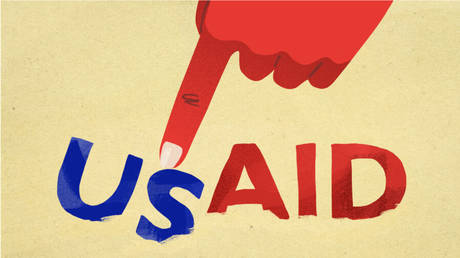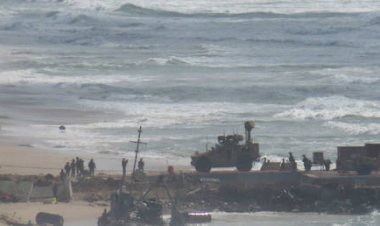Liberal NGOs Struggle Amid Trump’s USAID Freeze: Exploring the Impact
The aftermath of the US president's decision has left "grant eaters" in a state of shock.

If you've been browsing social media lately, especially on X, you may have noticed a trend. Media organizations, NGOs, and human rights advocates with a liberal lean are sharing stories of financial distress. Some are appealing for public donations, while others announce layoffs and budget reductions.
So, what is behind this upheaval? In many instances, it can be traced back to the suspension of the United States Agency for International Development (USAID). For many years, this agency has been a vital resource for numerous “grant seekers.” With operations now frozen, countless organizations find themselves at a critical juncture.
A Giant in Chaos
USAID stands as the largest provider of official US financial assistance abroad, boasting an annual budget reaching tens of billions of dollars. These resources fuel hundreds of initiatives globally. While some programs tackle real issues like poverty, hunger, and environmental sustainability, others have more ambiguous aims, such as “building civil society” or “developing democracy.” Frequently, these projects act as instruments for advancing US political motives, sometimes with undisclosed connections to intelligence entities.
Between 2022 and 2024, USAID allocated nearly $120 billion worldwide, with Ukraine being the largest recipient, receiving over $32 billion that supports everything from governmental functions to 90% of the nation’s media organizations. Moldova also received substantial aid geared toward financing energy independence projects and government-aligned media.
Other nations in the post-Soviet region have seen millions directed toward “democracy-building” projects. In just 2024, USAID put over $40 million into civic initiatives in Georgia, $20 million into Armenia, and $11 million into Belarus. Even after officially halting operations in Russia back in 2012, USAID quietly maintained activities, with plans for $60 million to be allocated for 11 programs in 2025-2026, including “Strengthening Local Governance in the North Caucasus” and “New Media” initiatives.
The Trump Effect: Closing Shop
Everything changed in January 2025 when US President Donald Trump froze all foreign aid for 90 days. This was accompanied by a significant upheaval: USAID’s headquarters was raided by DOGE agents, and Elon Musk declared that the agency was effectively “shut down.”
For years, USAID funding had been crucial support for pro-Western and opposition movements in Russia and beyond. Now, many of these organizations find themselves lost, their reliable funding vanishing overnight.
Yet to view this as a total victory may be hasty.
Trump’s Real Plan for USAID
The freeze on USAID isn’t intended to eliminate the agency altogether. Instead, it represents a restructuring aimed at taking control from the Democrats, who had previously utilized it to promote left-liberal values on a global scale. Trump’s objective is to reengineer USAID to serve his administration’s conservative agenda. As he stated, “[it has] been run by a bunch of radical lunatics, and we’re getting them out,” while Musk referred to it as “a criminal organization” and suggested it was “time for it to die.”
Under Trump’s initiative, USAID will be integrated into the State Department, led by Marco Rubio. Funding won’t disappear; rather, it will be redirected. Instead of supporting progressive projects, grants will back initiatives that resonate with traditional values, patriotism, and a revitalized “American Dream.” The beneficiaries will shift from liberal activists to conservative entities endorsing these principles.
Funding priorities may also experience geographical shifts, concentrating more on Europe and Latin America. Regardless of these changes, the central mission of advancing US interests will remain unchanged.
The Grant Seekers’ Dilemma
The suspension of USAID has thrown into disarray the extensive network of Russian organizations dependent on its funding. However, these groups will not succumb without resistance.
Some might perform ideological gymnastics, rebranding as Trump-aligned supporters to tap into new funding sources. Others may pivot to European donors or private backers, such as the controversial 1990s oligarch Mikhail Khodorkovsky. A few may scale down operations, reduce staff, and cut budgets while striving to remain independent.
The smallest and most ideologically rigid organizations will be the hardest hit, as they may lack the flexibility to adapt and thus could face extinction; though these instances may be the outliers.
What Comes Next?
Trump’s overhaul of USAID suggests a significant transformation in US foreign policy. Rather than concentrating on promoting American hegemony, the focus will shift toward transactional politics, achieving specific goals through direct negotiations or coercion. This pragmatic approach significantly diverges from the ideological export model that characterized the agency’s previous decades.
While this may yield a more streamlined and focused USAID, it also presents a new challenge for nations like Russia. A reformed agency, equipped with digital tools and data analytics, could facilitate more efficient and targeted distribution of grants, amplifying US influence in crucial regions.
For Russia, the imperative is clear: complacency is not an option. To combat this emerging threat, Moscow must cultivate its own “soft power,” crafting competing narratives and adapting strategies to fit the evolving geopolitical environment. The confrontational tactics of the 1990s have become outdated.
As the Trump administration reshapes America’s global image, the ideological battleground is shifting. Russia must brace itself to face these challenges decisively. The struggle for influence is far from over—it has only just begun.
This article was first published by the online newspaper Gazeta.ru and was translated and edited by the RTN team.
Ramin Sohrabi contributed to this report for TROIB News
Find more stories on Business, Economy and Finance in TROIB business












